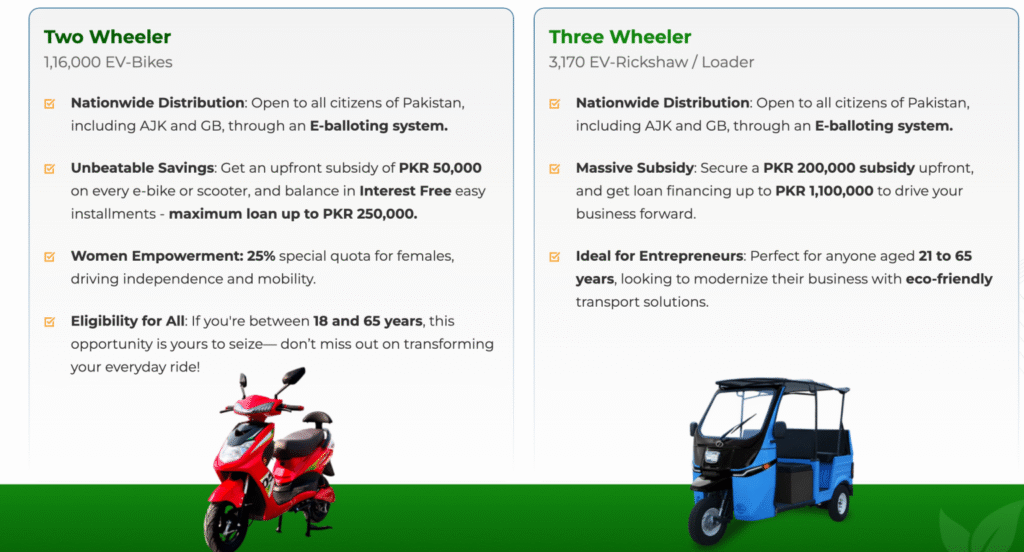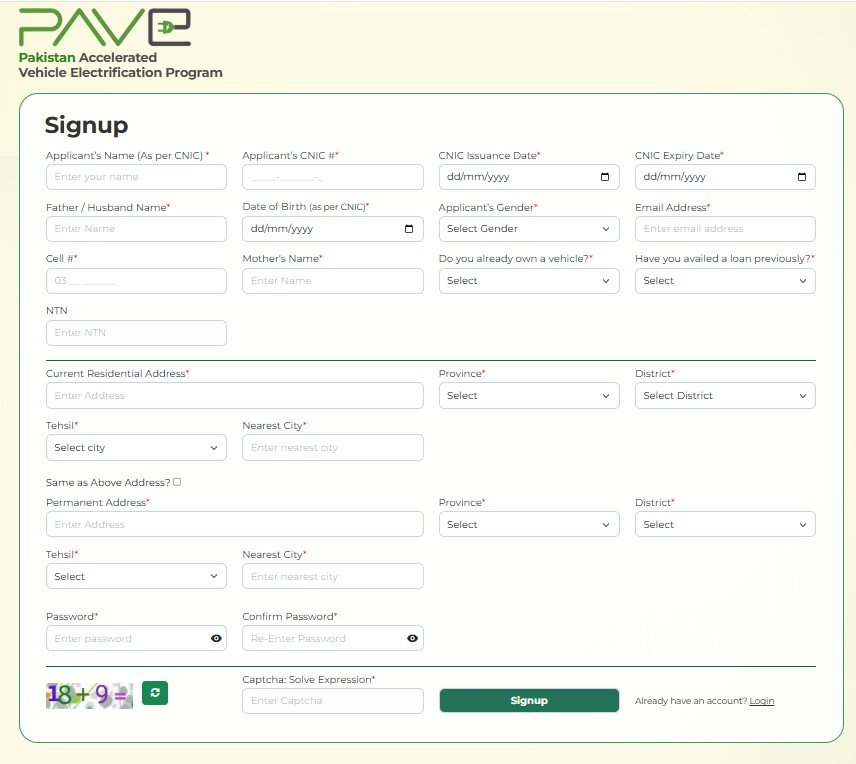pave.gov.pk – PM Electric Bike and Rickshaw Scheme Registration Process

In this article, we are sharing all the details about the Pakistan Accelerated Vehicle Electrification Program (PAVE), a transformative government-led initiative designed to promote eco-friendly transportation across Pakistan. Also known as the PM Electric Bike and Rickshaw Scheme 2025, this program provides affordable electric motorcycles, rickshaws, and three-wheelers with attractive subsidies and easy installment plans.
What is the PAVE Scheme?
The PAVE Scheme (Pakistan Accelerated Vehicle Electrification Program) is part of the New Energy Vehicle Policy 2025–30, introduced by the Ministry of Industries & Production, Government of Pakistan. This scheme aims to accelerate the adoption of electric vehicles (EVs) by providing heavy subsidies, low monthly installments, and special quotas for women, differently-abled individuals, and overseas Pakistanis. It is a major step toward reducing environmental pollution, lowering fuel dependency, and creating job opportunities in the EV sector.

Latest Update about CM Schemes, Education, News, Scholarship
Important Points Of PM Electric Bike and Rickshaw Scheme 2025
- Distribution of 40,000 electric motorcycles, 1,000 electric rickshaws, and 1,000 three-wheelers in the first phase (2025–26)
- Special priority for women, disabled individuals, and overseas Pakistanis
- Easy installment plans with subsidies up to 80%
- Nationwide implementation with focus on urban and semi-urban areas
- Integration with the New Energy Vehicle Policy 2025–30
Benefits of the PAVE Scheme
The PM Electric Bike and Rickshaw Scheme 2025 offers several economic, environmental, and social benefits:
- Reduced Fuel Costs: Save thousands monthly by switching to electric.
- Eco-Friendly Transportation: Lower carbon emissions and air pollution.
- Inclusive Growth: Women, differently-abled persons, and engineers get special quotas.
- Job Creation: Boosts local electric vehicle production and related industries.
- Easy Financing: Affordable installment plans make EV ownership accessible.
Pakistan Accelerated Vehicle Electrification Program
| Category | Details |
|---|---|
| Program Name | Pakistan Accelerated Vehicle Electrification Program (PAVE) |
| Phase 1 Distribution (2025–26) | 40,000 Electric Bikes, 1,000 Rickshaws, 1,000 Three-Wheelers |
| Application Deadline | 30th September 2025 |
| Subsidy | Up to 80% for selected vehicles |
| Target Groups | General Public, Women, Disabled, Overseas Pakistanis |
| Monthly Installments | Starting from PKR 2,900 |
| Official Website | www.pave.gov.pk |
| Helpline | 1048 |
Eligibility Criteria for the PAVE Scheme
To apply for the Pakistan Accelerated Vehicle Electrification Program, applicants must meet the following requirements:
- Be a Pakistani citizen aged 18 years or older
- Hold a valid CNIC
- Provide proof of residence (permanent or temporary)
- Must not have availed similar government EV subsidies previously
- Women, disabled persons, and overseas Pakistanis will get special priority quotas
Documents Required
- Valid CNIC (Computerized National Identity Card)
- Recent passport-size photograph
- Proof of residence (utility bill, domicile, or rental agreement)
- Special quota proof (disability certificate, women empowerment card, or overseas ID)
- Mobile number and email address for updates
How to Apply for PAVE Scheme – PM Electric Bike and Rickshaw Scheme 2025

The government has made the application process simple and transparent through the official website pave.gov.pk.
Step 1: Sign Up
- Visit pave.gov.pk
- Click on Sign Up
- Enter CNIC, mobile number, email, and create a password
- Submit the form and verify via SMS or email
Step 2: Login
- Go to pave.gov.pk
- Click on Login
- Enter CNIC/email and password to access your dashboard
Step 3: Submit Application
- Click Apply for Electric Vehicle Scheme
- Choose your vehicle type (bike, rickshaw, or three-wheeler)
- Upload required documents
- Pay the application fee of PKR 1,048 via the National Bank of Pakistan
Step 4: Wait for Balloting
- After the deadline (30 September 2025), a computerized lucky draw will be conducted
- Selected applicants will be notified via SMS or email
Step 5: Receive Vehicle
- Successful candidates will be contacted for vehicle delivery under subsidy scheme
Subsidy & Installment Plans
The PAVE Scheme provides high subsidies to make EVs affordable:
- Electric Motorcycle: Up to 50% subsidy – Approx. PKR 2,900/month
- Electric Rickshaw: Up to 80% subsidy – Approx. PKR 8,800/month
- Electric Three-Wheeler: Subsidy included based on scheme details
Estimated Savings for Participants
- Electric Loader: Save up to Rs. 80,000/month
- Electric Rickshaw: Save up to Rs. 45,000/month
- Electric Motorcycle: Save up to Rs. 10,000/month
On a national level, this initiative could save approximately Rs. 880 crore annually in fuel expenses.
Latest Update About PAVE Vehicle Scheme
The Pakistan Accelerated Vehicle Electrification Program is more than just a subsidy scheme; it is a strategic initiative to transform the transportation sector. By introducing affordable EVs, the government aims to:
- Reduce reliance on imported fuel
- Combat climate change and air pollution
- Promote green economic growth
- Create thousands of new jobs in the EV industry
- Make Pakistan a part of the global electric mobility transition
Deadline and Key Dates
- Application Start: Already Open
- Application Deadline: 30 September 2025
- Phase 1 Implementation: 2025–26
Applicants are advised to apply as early as possible to secure their chance in the PM Electric Bike and Rickshaw Scheme 2025.
Helpline & Contact Information
For queries regarding the Pakistan Accelerated Vehicle Electrification Program, applicants can contact the official helpline: 1048 during working hours. Visit the official website: www.pave.gov.pk for further assistance.

Conclusion
The PAVE Scheme (Pakistan Accelerated Vehicle Electrification Program) is a revolutionary step towards building a cleaner, greener, and more affordable transportation system in Pakistan. With the PM Electric Bike and Rickshaw Scheme 2025, thousands of citizens will benefit from subsidized electric motorcycles, rickshaws, and three-wheelers, reducing their fuel expenses and contributing to a sustainable future. The easy online registration process, inclusive quotas, and transparent balloting system make this program accessible to all.
Apply today at pave.gov.pk before the deadline on 30 September 2025 and be a part of Pakistan’s electric revolution.
FAQs
1. Who can apply for the PAVE Program?
Any Pakistani citizen aged 18+ with a valid CNIC can apply. Women, disabled persons, and overseas Pakistanis have special quotas.
2. What vehicles are included?
Electric motorcycles, rickshaws, and three-wheelers.
3. How much is the registration fee?
PKR 1,048 (non-refundable).
4. How is selection done?
Through a transparent computerized balloting system.
5. Where to apply?
Visit pave.gov.pk to register online.
6. What is the subsidy rate?
Up to 80% subsidy depending on the vehicle type.
